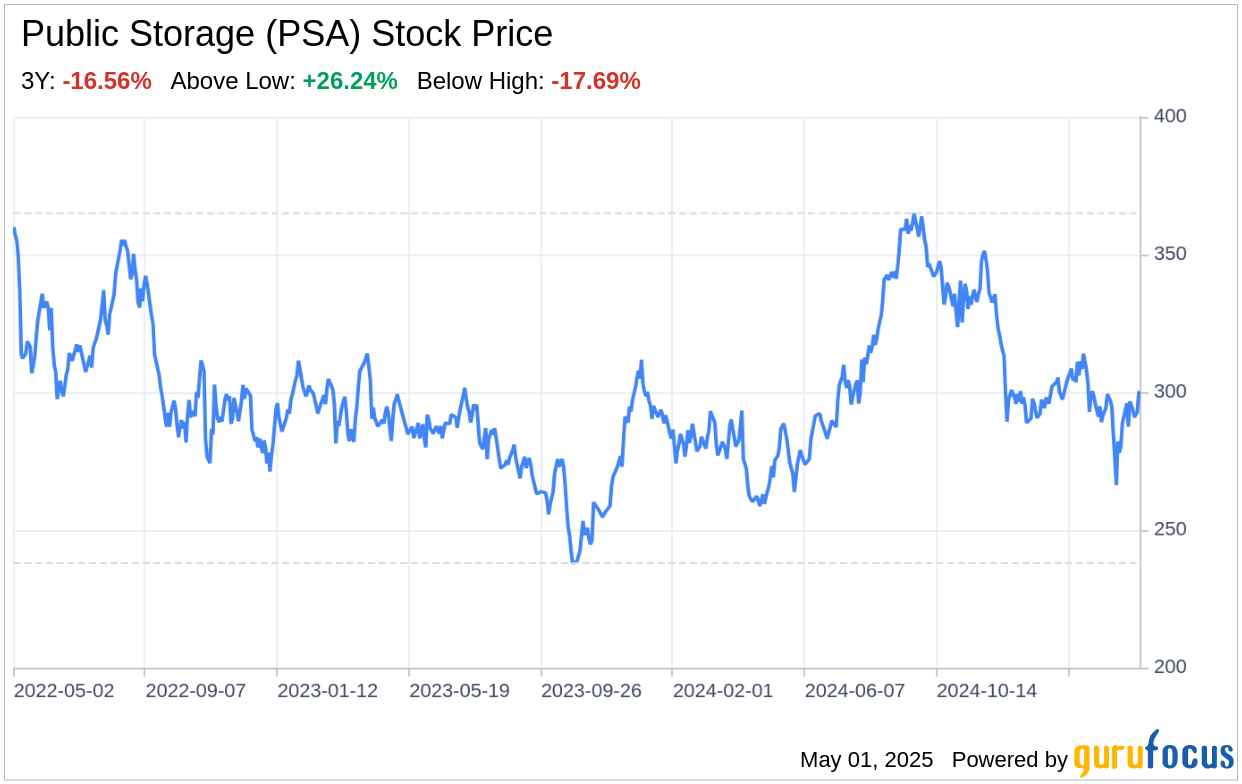Public Storage (PSA, Financial), the largest owner of self-storage facilities in the US, has released its 10-Q filing for the quarter ended March 31, 2025. This SWOT analysis delves into the company's financial health and strategic positioning. As of the filing date, PSA boasts over 3,300 self-storage facilities across 40 states, with approximately 245 million square feet of rentable space. The company's financial tables reveal a solid performance, with nine new facilities acquired at a cost of $141 million and development activities amounting to $144.4 million, adding significant rentable square footage. PSA's investment in Shurgard Self Storage Limited, valued at approximately $1.3 billion, underscores its international presence. With a market capitalization in the billions and a diverse portfolio that includes merchandise sales, property management, and insurance services, Public Storage (PSA) remains a formidable player in the self-storage industry.

Strengths
Market Leadership and Brand Recognition: Public Storage (PSA, Financial) stands as the industry leader in the self-storage sector, with a sprawling network of over 3,300 facilities. The company's brand is synonymous with self-storage, providing a competitive edge in attracting and retaining customers. PSA's market dominance is further cemented by its significant rentable space, which surpasses 245 million square feet. The brand's recognition is not limited to the US; through its equity interest in Shurgard, PSA has a foothold in the European market, enhancing its global presence. The company's financial strength is evident in its ability to acquire new facilities and expand existing ones, with a recent investment of $141 million in acquisitions and $144.4 million in development, signaling both growth and financial robustness.
Diversified Revenue Streams: Beyond its core self-storage offerings, PSA has diversified its revenue through ancillary services, including tenant reinsurance, merchandise sales, third-party management, and bridge lending. These services not only contribute to the bottom line but also create a comprehensive ecosystem that enhances customer retention and satisfaction. The insurance business, in particular, offers products that cover losses for goods in storage, adding a layer of security for customers and an additional revenue stream for the company.
Weaknesses
Operational Costs and Efficiency: Despite PSA's impressive scale, the company faces the challenge of managing operational costs, which can impact profitability. The direct costs, such as property taxes, payroll, and maintenance, along with indirect costs like supervisory payroll and centralized management expenses, require careful management to maintain margins. The company's filing indicates a focus on enhancing operational processes to moderate on-site property manager payroll expenses, reflecting an ongoing effort to improve efficiency and reduce costs.
Dependence on Economic Cycles: The self-storage industry is sensitive to economic cycles, with demand often correlated with housing market trends and consumer spending. Economic downturns or shifts in consumer behavior could lead to decreased demand for storage units, impacting occupancy rates and revenue. PSA's performance, while currently strong, could be vulnerable to broader economic fluctuations that influence the need for self-storage solutions.
Opportunities
Expansion and Development Projects: PSA's aggressive acquisition and development strategy presents significant opportunities for growth. The company's recent acquisitions and ongoing development projects, including the addition of 0.7 million net rentable square feet, demonstrate its commitment to expanding its market share. Furthermore, PSA's solar program, with installations on 946 facilities, reflects an investment in sustainability that could lead to long-term cost savings and an enhanced brand image.
International Growth Prospects: The indicative offer to acquire a substantial interest in Abacus Storage King, a leading self-storage owner in Australia and New Zealand, represents a strategic move to tap into established and growing markets outside the US. This expansion could diversify PSA's geographic footprint, reduce reliance on the US market, and provide new revenue streams. The potential collaboration with Ki Corporation in this acquisition underscores PSA's ability to forge strategic partnerships to facilitate international growth.
Threats
Competitive Pressures: The self-storage industry is highly competitive, with numerous players vying for market share. PSA's leading position could be challenged by competitors who offer innovative services, lower prices, or more convenient locations. The company must continuously innovate and invest in customer experience to maintain its competitive advantage and prevent erosion of its market share.
Regulatory and Market Risks: PSA's operations are subject to various regulations, including zoning laws and environmental regulations, which can impact the development and operation of facilities. Additionally, the company's exposure to market risks, such as interest rate fluctuations and foreign currency exchange rates, could affect its financial performance. The filing notes a significant increase in foreign currency exchange losses, highlighting the need for effective risk management strategies to mitigate these potential impacts.
In conclusion, Public Storage (PSA, Financial) exhibits a robust market position with a strong brand, extensive network, and diversified revenue streams. However, operational efficiencies and economic sensitivities present ongoing challenges. Opportunities for expansion, both domestically and internationally, offer pathways for growth, while competitive and market risks require strategic vigilance. PSA's forward-looking strategies, including its solar program and potential acquisition of Abacus Storage King, demonstrate a proactive approach to leveraging strengths and capitalizing on opportunities, positioning the company to navigate weaknesses and threats effectively.
This article, generated by GuruFocus, is designed to provide general insights and is not tailored financial advice. Our commentary is rooted in historical data and analyst projections, utilizing an impartial methodology, and is not intended to serve as specific investment guidance. It does not formulate a recommendation to purchase or divest any stock and does not consider individual investment objectives or financial circumstances. Our objective is to deliver long-term, fundamental data-driven analysis. Be aware that our analysis might not incorporate the most recent, price-sensitive company announcements or qualitative information. GuruFocus holds no position in the stocks mentioned herein.
